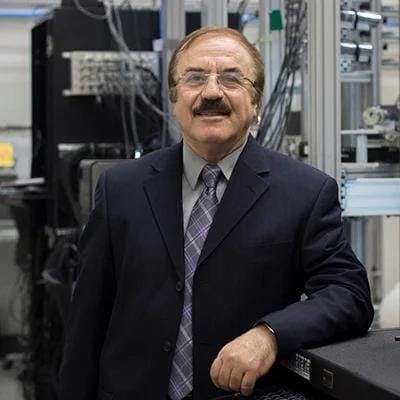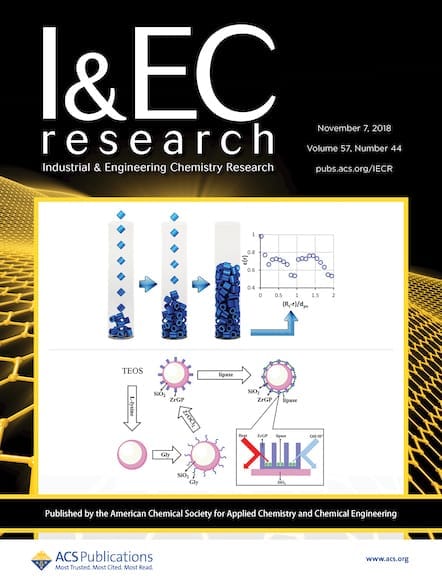From pioneering research to shaping the next generation of scholars, Prof. Al-Dahhan’s impact resonates across science, engineering, education, and beyond. Join us as we pay tribute to his illustrious career and remarkable achievements.

It is with great pleasure and admiration that we introduce this Virtual Special Issue of Industrial & Engineering Chemistry Research, honoring the illustrious career and contributions of Professor Muthanna H. Al-Dahhan. As guest editors, we are privileged to present this compilation of works by colleagues and collaborators, celebrating his remarkable achievements, leadership, pioneering research, and dedication as an educator.
Born and raised in a modest family, Professor Al-Dahhan exhibited exceptional academic prowess from a young age, consistently ranking at the top of his classes and demonstrating an insatiable thirst for learning. His journey in academia began at the University of Baghdad, Iraq, where he graduated as the first-ranked student in the Chemical Engineering Department. The young researcher then moved to Oregon State University, United States, where he worked under the guidance of Dr. Charles Wicks, pursuing a master’s degree that resulted in the development of the Al-Dahhan Cell (1988) for liquid-liquid mass transfer and reaction studies (which was later refined to evolve into the Dow-Al-Dahhan Cell for gas-liquid mass transfer and reaction studies). At Oregon State, Dr. Al-Dahhan also came under the mentorship of Professor Octave Levenspiel, the patriarch of chemical reaction engineering, developing Chapter 27 for his OmniBook, a relationship that Al-Dahhan cherishes to this day.
Recommended by Professor Levenspiel, Dr. Al-Dahhan went on to pursue his doctoral research under the direction of Professor Michael Dudukovic at the Chemical Reaction Engineering Laboratory at Washington University in St. Louis. This was a major turning point in his career, as he started working on three-phase catalytic reactors, specifically on the hydrodynamics of trickle bed reactors. His work elucidated, among others, the effect of packing fines in trickle bed reactors, the operation of trickle bed reactors under high pressure, and catalytic wetting efficiency. His doctoral work resulted in several seminal papers that are important milestones in the understanding of trickle bed reactors.
Upon completing his Ph.D., Dr. Al-Dahhan had a brief stint in industry at Xytel Corporation and subsequently returned to the Chemical Reaction Engineering Laboratory (CREL) at Washington University in St. Louis, United States, to pursue an academic career. Together with senior colleagues, Drs. Michael Dudukovic and P. A. Ramachandran, Dr. Al-Dahhan embarked on two decades of prolific research in reaction engineering. The Laboratory established itself as a key research center on non-invasive imaging of multiphase reactors, computational fluid modeling of reactors, and scale-up and scale-down of reactors, among others.
Later, Dr. Al-Dahhan moved to the Missouri University of Science and Technology, United States, where he has been since pursuing a distinguished career in research and academics, where he is currently the Curators’ Distinguished Professor of Chemical and Biochemical Engineering and Nuclear Engineering and Radiation Science, as well as the Laufer Endowed Chair in Energy. He has also served as Chair of the Department of Chemical and Biochemical Engineering from January 2009 to June 2019.

Special Issue Honoring Prof. Muthanna H. Al-Dahhan
His research endeavors cover critical areas including sustainable energy production, clean energy and fuel generation, biomass and coal conversion, waste treatment, and the development of safe nuclear energy solutions. Dr. Al-Dahhan’s team remains at the forefront of developing cutting-edge measurement techniques and computational models for studying multiphase reactors and flow systems. His development of unique gamma-ray imaging and visualization techniques and other sophisticated methodologies has set a global standard, enabling scientists and engineers to gain unprecedented insights into complex multiphase processes.
Beyond his research, Dr. Al-Dahhan's leadership and commitment to education have left an indelible mark on students, researchers, and industry professionals. He mentored many generations of engineers and scientists, instilling in them a passion for excellence, innovation, and ethical leadership. His contributions and commitment to education extend beyond his institution. Dr. Al-Dahhan is an ABET Program Evaluator and is an affiliated Professor with ACER CoE of the Mohammed VI Polytechnic University (UM6P), Morocco.
Dr. Al-Dahhan has led and participated in several research consortia during his career at Washington University and subsequently at Missouri S&T: The Chemical Reaction Engineering Laboratory at Washington University; the Slurry Bubble Column Consortium along with Dr. L. S. Fan (The Ohio State University, United States) and Drs. Steve Antal and R. T. Lahey (Rensselaer Polytechnic Institute, United States); the NSF Engineering Research Center for Environmentally Beneficial Catalysis (along with Professor Bala Subramaniam of the University of Kansas, United States, and other partners); and Multiphase Flows and Reactors Engineering and Education at Missouri S&T are only a few examples of centers of research and academic consortia in which Dr. Al-Dahhan has had either a leadership or a very active mentor role. Dr. Al-Dahhan is also a Fellow of the AIChE, the leading professional organization of chemical engineers.
In closing, we congratulate Professor Muthanna Al-Dahhan for his remarkable lifelong achievements and thank him for his decades of dedication to advancing science, engineering, and education. May his legacy inspire future scholars and innovators to pursue excellence and make a meaningful impact on the world. We extend our gratitude to Professor Phillip E. Savage, former Editor-in-Chief of Industrial & Engineering Chemistry Research, and Professor Michael Baldea, the current Editor-in-Chief, for their support and dedication in bringing this special issue to fruition. We also convey our heartfelt thanks to all the authors and reviewers who have contributed to the success of this endeavor.
Sincerely,
Prof. Jorge Ancheyta, Guest Editor
Mexican Institute of Petroleum, Mexico
Prof. Markus Schubert, Guest Editor
Technische Universität Dresden, Germany
Prof. Shantanu Roy, Guest Editor
Indian Institute of Technology – Delhi, India
